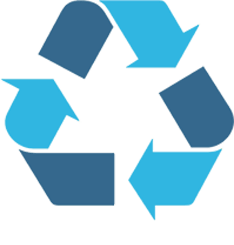Customers will be able to take any old electrical equipment to participating civic amenity sites (often known as ‘household waste recycling centres’) run by their local councils. Please remember that this equipment will be further handled during the recycling process, so please be considerate when depositing your equipment.
Funding collected through the Distributor Take Back Scheme has been distributed between all Local Authorities in the UK to ensure the provision of improved recycling facilities. Producers of these products will then ensure that deposited items are taken away and recycled.
Wherever practical, old electrical waste should not be disposed of with your household waste. You can locate your closest participating collection site at www.recycle-more.co.uk (please remember to have your postcode to hand).
UK households dispose of over 1.2 million tonnes of electrical and electronic waste every year. This is the equivalent of 150,000 double decker buses and would be enough to fill the new Wembley Stadium 6 times over.
Much of the UK’s electronic waste ends up in landfill sites, where toxins put communities at risk. Failure to segregate any type of recyclable material in the home will usually result in items being disposed of in a landfill site (buried in the ground in the UK) or being incinerated. To remind you to recycle, all new electrical products are marked with a crossed out wheeled bin symbol.
With effect from July 2007, the UK’s Waste Electrical and Electronic Equipment (WEEE) Regulations require that all producers of electrical equipment are now obliged to pay for these items to be recycled when they become waste. These regulations also require that all retailers both actively assist in delivering a UK wide WEEE collection infrastructure and encourage the participation of consumers in recycling electronic equipment.
So that you can get your waste electrical goods recycled, we have contributed towards a national fund to assist local councils to further develop their existing waste electronics collection facilities, which will in turn allow producers of this equipment to meet their obligations.
Not all council sites are suitable to collect all types of waste electrical goods but to find out your nearest participating site (including other collection facilities that may not be operated by the council) and for advice on all aspects of recycling at home, please visit www.recycle-more.co.uk.
Electronic waste is one of the fastest growing waste streams and much of it can be recycled and resources recovered to make new consumer goods. To ensure your waste electronics don’t contribute to damaging the environment, please use www.recycle-more.co.uk and recycle today. In order to partially meet our obligations as a distributor as defined in the UK Waste Electrical and Electronic Equipment (WEEE) Regulations (SI 2006 No. 3289 – 11th December 2006), we have opted to become a full member of the Distributor Take back Scheme (DTS) as defined in regulation 35 of the WEEE Regulations.
As a member of the DTS, we have made a financial contribution toward the development of the network of Designated Collection Facilities (DCFs) for WEEE instead of collecting waste items instore. This financial contribution is described in paragraphs 83 to 88 of the UK WEEE guidance, and has been used to improve the WEEE collection facilities located at Local Authority Civic Amenity sites. To locate your local WEEE collection site, please visit www.recycle-more.co.uk or contact our customer services department.

